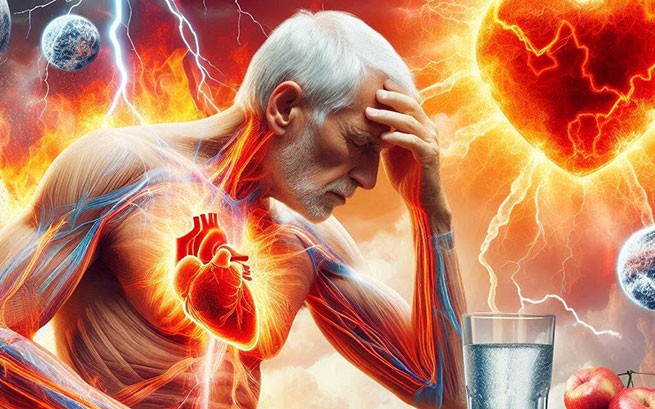Image created by AI
Cardiologist Spyros Papaioannou, director of the 2nd Cardiology Clinic of the Athens Naval Hospital, says heat and very high temperatures can trigger cardiovascular diseases.
“It is now a fact that the summer months in our country are showing increasingly high temperatures year after year, leaving vulnerable groups of the population, such as those with heart disease, worried about the consequences this may have on their health,” says the cardiologist. – Indeed, heat and very high temperatures can trigger cardiovascular diseases, the most common of which are myocardial infarction and stroke, while the induction of arrhythmias is also strongly observed during periods of heat. In addition, under conditions of extreme heat, there may be a disturbance in the regulation of heart failure or a worsening of severe valvular heart disease.”
Research shows that just a 1 degree Celsius rise in temperature increases the risk of cardiovascular disease
When the body is exposed to excessively high temperatures, thermoregulatory mechanisms are activated in order to prevent further increase in body temperature and, on the other hand, to displace excess heat.
Peripheral vasodilation, tachycardia, rapid breathing and sweating are the signs that appear in the human body in hot conditions, while the symptoms that patients usually experience are weakness, fatigue, cramps and heat stroke. It is estimated that it takes about 7-14 days for the human body to acclimatize to extreme heat.
Vulnerable Populations – When to Call the Doctor
Vulnerable groups include the elderly, patients with a history of coronary artery disease (myocardial infarction or those who have undergone angioplasty/bypass surgery), heart failure, severe valvular disease, alcoholics or those with mental illness, patients with lung disease and those living in poorly ventilated areas and without air conditioning.
Symptoms that should bring heart disease patients to the doctor include chest discomfort, dizziness, fatigue, a feeling of rapid heartbeat, headache, and a tendency to faint.
Recommendations
Instructions for preventing the above symptoms include avoiding sun exposure during hours of intense radiation (11:00 a.m. to 5:00 p.m.), strictly limiting intense physical overexertion, sports, and physical work, especially in open spaces with increased temperatures, and eating large meals. In addition, many patients with cardiovascular disease will likely need to change their therapy for hypertension or heart failure, especially those taking diuretics.







More Stories
Caution: Plague detected in arthropods
Medicines and vitamins that should not be taken with dairy products
Coffee: How the Number of Cups We Drink Affects Us